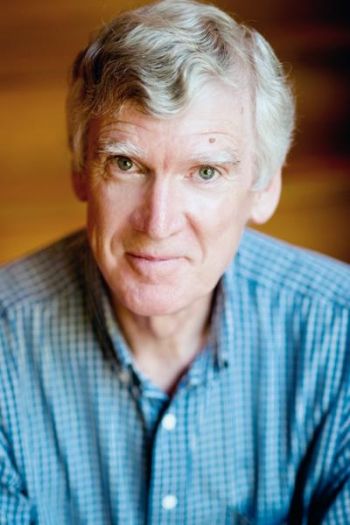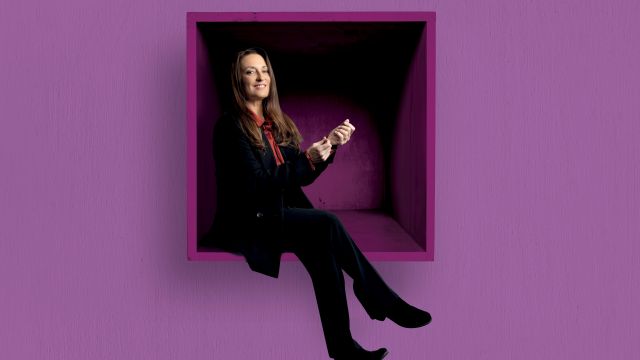Why Williamson Can’t Stop Writing
Image: Georgie Parker - The Great Divide. Photographer: Brett Boardman.
Australia’s most successful playwright, David Williamson, has burst out of retirement to premiere three new plays this year in Sydney, Adelaide and Noosa. In a wide-ranging interview with David Spicer, the 82-year-old discusses the prevailing themes of Australian theatre, the issues raised in his latest offerings, and names the best and worst plays of his career.
The first Williamson World Premiere for 2024, The Great Divide, about a town being torn apart by a developer, played at the Ensemble Theatre; the next, a sex farce set called The Puzzle, set on a cruise ship, premieres in September at State Theatre Company South Australia, while Noosa Arts Theatre hosted an “out of town try-out” of Aria, about a narcistic matriarch which will open next year at the Ensemble Theatre.
David Spicer: When we last spoke a few years ago, you were adamant about retiring. What changed?
 David Williamson: Look, my health stabilized, which was a great help. I can't stop being a compulsive writer when I'm well enough; I can't stop new ideas hitting me. Creativity comes from below your conscious level. So perhaps the dam level was building up down there and suddenly flooded over. I don't know why, but at this particular time I was struck with a feeling there were some plays I had to write. They forced themselves upon me.
David Williamson: Look, my health stabilized, which was a great help. I can't stop being a compulsive writer when I'm well enough; I can't stop new ideas hitting me. Creativity comes from below your conscious level. So perhaps the dam level was building up down there and suddenly flooded over. I don't know why, but at this particular time I was struck with a feeling there were some plays I had to write. They forced themselves upon me.
DS: Do you agree that the voices of mature white male playwrights are not as valued as they might have been in the past?
DW: I think so. Our theatre for the last 30 or 40 years has been obsessed with identity politics, which are the grievances of a particular group. They let us know about that grievance and it has resulted in some pretty good and powerful theatre. I am not denying that.
But it struck me that whilst identity politics is powerful and strong and gives rise to creativity, there are bigger elephants in the room that Australian drama has just not noticed in the last 30 or 40 years, in its energy to put identity issues on stage.
Two news items struck me the other day. One was that Gina Rinehart and Twiggy Forrest have doubled their net worth in two years by mining our minerals. Now they are into ridiculous levels of 30 plus billion. On the very next day, it was reported that three million Australian families suffered food anxiety.
Now it's all very well to rage against the injustice of the glass ceiling or something like that, but what has happened to Australia is perhaps an even bigger question. We are now (amongst) the wealthiest nations per capita on the face of this earth. And we're (amongst) the worst in terms of inequality, yet Australian drama has conveniently ignored that fact for the last 40 years.
Also, by and large, it's ignored the huge existential crisis of climate change. I think perhaps, there is a place for aging white males who maybe have a larger overview of our societal problems. There are society wide issues that go beyond identity politics that just haven't been addressed.
DS: And are those issues touched on in your three new plays?
DW: Well, certainly in the one coming first at the Ensemble Theatre. It’s called The Great Divide and it's a dark comedy that shows how neoliberalism and the dominant right-wing press have caused Australia to be reshaped. If you're lucky enough, if you're one of the 20% that's on the right side of the great divide, you are having a great life. But if you're one of the 80% that aren't on the right side, you're not having such a great life.
The Great Divide looks at that question. It's not a diatribe, it's entertaining with good characters, but it does attempt to show us what kind of Australia we're living in.
DS: In the play, you've got an immensely wealthy developer, Alex Whittle (Georgie Parker), who wants to put a town firmly on the tourist map, and she's described as a human bulldozer. Can you give us a flavour of the drama?
DW: George Bernard Shaw said always give the devil the best lines. And Alex's line is that those who can't afford don't deserve. And (she’s pitted against) a single mother, very much on the other side of the great divide, who is struggling to keep abreast with a young seven-year-old daughter. She’s stacking supermarket shelves, not because she's not bright, but she got pregnant at the wrong time and had to leave school. And she's very much on the other side of it.
John Wood plays the town mayor of the pro-development council, desperate to see their beautiful little town transformed into the Gold Coast. The council loves development, because more tourists means more money. The price of housing shoots up, so their net worth goes up, but it’s a pity about the poor renters. It’s just like Noosa, and Byron Bay, where the workforce that serves the wealthy must live way out of town because they can't afford the rent in town.
Alex swings into the town, with her much-abused personal assistant, looking to create the next town for wealthy tourists and IT professionals, using every nasty tactic in the book.
It's a state-of-the-nation play. We don't have enough state-of-the-nation plays. That's perhaps why aging white males might have an overview that the others don't. I've watched our society change very much, from 1962 when Australia was truly an egalitarian country to where we are not now.
DS: I'm intrigued to find out who wins.
DW: It’s a David versus Goliath story. Perhaps, in drama, we’re occasionally allowed to think that David has a chance, even if it never happens in real life.

DS: Later in the year you have a second World Premiere - The Puzzle - a saucy comedy at the State Theatre Company South Australia.
DW: This is a different kettle of fish. It’s an examination of how people who have everything still manage to stuff up their lives. It's the story of a suburban accountant who was divorced early, and feels he had lost touch with his 27-year-old daughter.
Eric Thompson is playing that hapless accountant. He thinks to get closer to his daughter they'll go on a cruise together. Unfortunately, he doesn't know anything about cruises and he books the wrong one. He books a lifestyle cruise, which is codeword for swingers. And there are two other bored affluent married couples on board who think they'll charge up their life with this new adventure.
Everything, of course, goes wrong as it does in good comedy, but this is a comedy that tries to say it's amazing that the people who have everything let a little bit of sexual boredom stuff up their whole lives. It’s a comment on human nature and I had great fun writing it.
DS: How common is it for people with everything going for them to stuff up their lives?
DW: Our psychiatric and psychology professions wouldn't exist without it, because the fees they charge to treat people's mental distress are humongous. So yes, the middle class and the wealthy are flocking to psychological health now. It indicates that they are successfully stuffing up their lives when everything indicates they shouldn't be doing so.
DS: Your third World Premiere, Aria, is being staged at a community theatre in Noosa. How did that come about?
DW: Aria is the Ensemble Theatre play for 2025. I said to (the Artistic Director) Mark Kilmurry that English and American playwrights rarely open their plays in the big cities. They have an out-of-town tryout to refine them. I said, “What about me? We've got an excellent little community theatre with top talent up here at the Noosa Arts Theatre, why not do our 2025 play up here with a very good cast and director.” Mark said what a great idea.
DS: Do you think that there should be more out-of-town tryouts across the board?
DW: That’s what Neil Simon did with The Odd Couple. For six months he toured the American provinces. He was there every night with his director, refining, shaping and changing. And someone said, “Gee, that's a well written play.” Well, yeah, I wish I had six months following a play around and refining it to. So yes, we could do more of that. Australian writers just get plonked in the cold light of day, in the major cities.
DS: What observations are you making about social issues or human nature in Aria?
DW: Aria delves back into the psychological research I have always been fascinated with. At university I studied social psychology, which is the effect other people have on our behaviour. I mean we're very social creatures; we spend half of our life worrying about what other people think of us.
Aria is about a narcissistic personality - someone who thinks the only reason the world is there is to shower praise on them. For all their magnificent achievements, or their magnetic personalities, a full-on narcissist can be a dreadful person.
In the play, the family matriarch believes she has three perfect sons who have all married unsuitable wives. Every year she gathers her sons together for lunch, to prey on them. The sons all happen to have their birthday on the same day, because two of them are identical twins. And it's an occasion to shower praise on her perfect sons, and not too subtly humiliate her daughters-in-law. This time, it's the revenge of the daughters-in-law.
DS: You’ve written over 50 plays during your career. Do you wish you’d had more time to craft them?
DW: Yes, there's a couple of them. Luckily, most of my career, I've had the luxury of a sort of out-of-town try out. The cast give me a read about eight weeks out from rehearsals. We sit around the table discuss the play - where it's working, where it's not. Then I go away and do a thorough rewrite before it gets into rehearsal. Then there’s a chance to do a bit more rewriting in rehearsal. You can’t change too much then, otherwise it will unsettle the actors and the director.
DS: Could you name a play of yours which definitely needed more work?
DW: Celluloid Heroes was meant to be a searing satire on the film industry back in the 1980s. But sadly, I had to be on hand in Egypt for the shoot of Gallipoli, so I wasn’t around to rewrite the second act, which was a disaster.
DS: And what are your favourite plays?
DW: Look, there's an A-List, where I think, “I got that one right.” There's a B-list where I think “I wish I’d had a bit more time to work on that one.” But I wrote my memoirs recently. I re-read all of them, some for the first time in forty years, and, by and large, I was happy with them; they stood up and the structure was good. I can understand why, for 25 years, I was the backbone of the Sydney Theatre Company.
One that I took great joy in recently was The Club, which has just had a record-breaking run at Beijing’s most prestigious theatre, with a lavish set. They are re-running it next year.

DS: Why did The Club strike a chord in China?
DW: They spend half their lives in committee meetings in China, and this is a play about a two-hour committee meeting. And the Chinese loved it.
DS: What are your other favourites?
DW: Emerald City, Money and Friends and I particularly love Dead White Males, because it did send up the excesses of post modernism which told us that Shakespeare was just a dead white male preaching male superiority and racism.
Whilst The Taming of the Shrew is anti-women and The Merchant of Venice is anti-semitic, Shakespeare also gave us the most profound insights into universal human nature that any writer has ever given us.
Yes, there's a place for old white male writers, although the gatekeepers are loath to admit it. But the only thing that's kept me alive in the face of the fashion for diversity (and diversity is the God word in Australian Theatre) is that is that for some strange reason people keep coming to my plays.
The Great Divide played from March 8 to April 27 at the Ensemble Theatre.
Aria played from April 18 until May 12 at the Noosa Arts Theatre.
The Puzzle premieres from September 20 until October 10 at the State Theatre Company South Australia.
Subscribe to our E-Newsletter, buy our latest print edition or find a Performing Arts book at Book Nook.

